
Photo: Paul Cox
While upheaval and uncertainty surrounds many junior-single seater championships, there is one category on the up: Formula Ford 1600.
The multi-manufacturer formula has been around since 1967, and was continuously the go-to place for racing drivers wanting to enter single-seaters between then and 1993, when the 1600cc Kent engine was replaced by an 1800cc Zetec unit in the national championships and end-of-season FFord Festival.
FFord’s popularity started to decline from that point, but drivers continued to race in FF1600 machinery, and current IndyCar stars Josef Newgarden and Spencer Pigot made their names there.
British FFord came to a close in 2014, a season on from an ill-guided decision to switch to slicks-and-wings, with the BRSCC National FF1600 championship effectively filling the void and growing in reputation ever since. It races in England, Wales and Northern Ireland, and was dominated last year by Team Dolan, run by the enigmatic Bernard Dolan.
Formula Scout caught the 53-year-old Irishman in the National paddock at Castle Combe last summer, where protege Niall Murray took a stunning triple win on the way to the title.
Dolan’s own racing career included the 1989 British FFord title and sixth in that year’s Festival, where he broke Brands Hatch’s lap record multiple times. Despite his obvious talent, his driving career went no further than British Formula 3. And after one more appearance in FF1600, Dolan was unheard of for almost a decade.

“When I walked away from the sport as a driver in 1993, I walked away completely from motorsport,” explains Dolan.
“Didn’t buy a magazine, didn’t watch it on television. From ?93 to 2000, I had very little knowledge of who did what in motorsport. Any racing driver who competed at a high level will tell you, it’s very hard to walk away from it, and when you can’t make it financially, you try to [keep going].
“I couldn’t see how I could raise the money to carry on though. So I just walked away from it.
“But I got back running cars [in ’00], in the sense that I?d got the drug out of my system as a driver, and was able to run cars [undistracted]. When running cars, it’s strange, you get the same drive and motivation to keep trying to win [as a driver]. And that’s what I enjoy about it, seeing drivers winning.?
Dolan’s first FF1600 driver, Noel Dunne, started that winning trend. He was Irish FFord champion in 2005, Festival winner a year later, and then added another Irish crown in ’09. It’s compatriot Murray who Dolan merits as the best driver he’s ever run though.
“He’s probably the most naturally gifted driver I’ve come across. No matter what conditions you put him in, he immediately adapts. You can always tell the good drivers from that, they’re the ones who are on it straight away.
“Niall first came to me in 2014 because I was approached by Motorsport Ireland [the country’s motorsport governing body], who wanted to create a young driver scholarship. Kevin O?Hara was the first driver of that programme, and we did Irish FFord, the Festival and the Walter Hayes Trophy. It was only a one year thing, so the next driver was Niall.
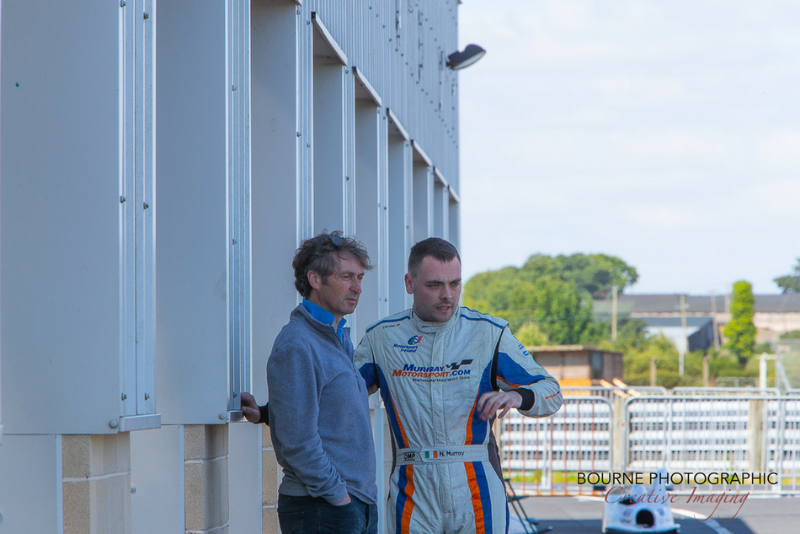
“He came to me with obviously a massive amount of speed – a jewel that we had to chip away to make him into a better driver, which we did.”
Jonny McMullan was the next recipient, and won the National FF1600 title, the first time Dolan had run a team in Britain. In 2016, Murray returned to Dolan without Motorsport Ireland backing, and duly dominated the National championship.
“When Niall was winning, we were getting a lot of grief from people thinking our engine was illegal. We didn?t have any wet races that year until the WHT final.?Of course they all thought: here?s our chance now of getting Niall Murray, it?s wet now. His engine?s not going to be that important.?What does he do? Blitz them all by eight seconds.”
Jake Byrne and James Roe Jr were the last recipients of the Irish backing, and for 2018 Dolan relocated his team’s facilities to Britain, having previously commuted to every round from Ireland. To do this he needed a base.
“I heard Ralph Firman [founder of constructor Van Diemen] had a workshop for rent, so I spoke to Ralph and rented it. It’s funny how paths cross over. Back when I was driving for Reynard he was the enemy, and now here we are, working together.”
Firman was also key to Dolan signing Jack Wolfenden, with Matt Round-Garrido and Murray being added to the roster shortly before the season began. Round-Garrido’s move from rival B-M Racing was prompted by the teenager?wanting someone “who he felt could bring him on as a driver and coach him”.
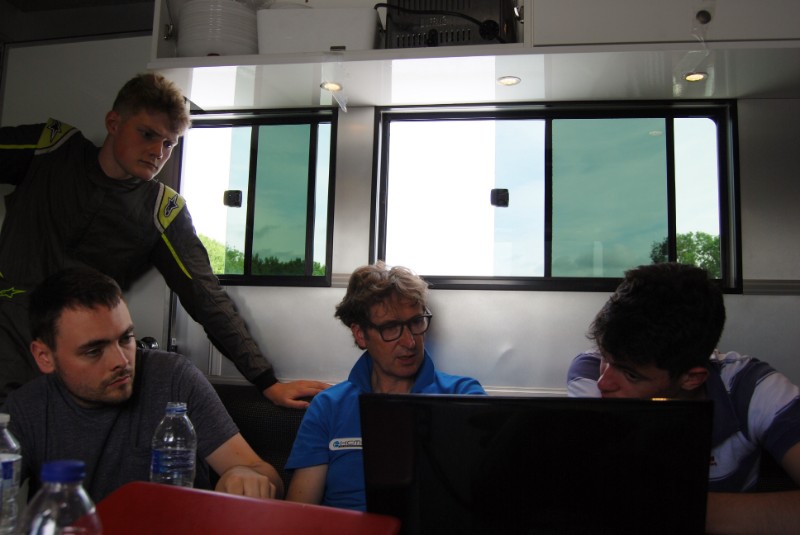
Photo: Taylor Walsh
Dolan’s approach to team management, which includes coaching, has been greatly appreciated by his drivers. Round-Garrido has described the coaching techniques as ?hard love?, with each debrief usually starting with a still from an onboard video and the question ?So what do you think you?ve done wrong there??. This disciplined style stems from Dolan approaching the role as if he were still a driver.
“What I’m trying to relate to the driver – what the car is doing – I?m trying to envisage in my own head how the car is handling, as though I’m driving it. By communicating to the driver, I get a feeling of what the car is doing.?Therefore, I can adjust the car accordingly and together we can make the package better.”
It’s a testament to Dolan’s engineering and coaching capability that his team won with two different manufacturers.?Van Diemen driver Murray took 11 wins from 20 races in a 19-year-old car, Round-Garrido won twice in a Medina, while Wolfenden struggled developing a new Firman chassis.
“How much better can Niall get?” ponders Dolan.
“Matt?s come on leaps and bounds, and the next level is Niall?s level. He?s knocking on the door, and it?s up to him to close that little bit of a gap. It?s not much, but it’s probably the hardest bit to find.
“If you look over the history of motorsport, there?s only a handful of little drivers that are able to perform at such a level. And I would put Niall in that category. But he?s not going to get a break at it, unfortunately. It’s a cruel sport. He doesn?t have the money.”
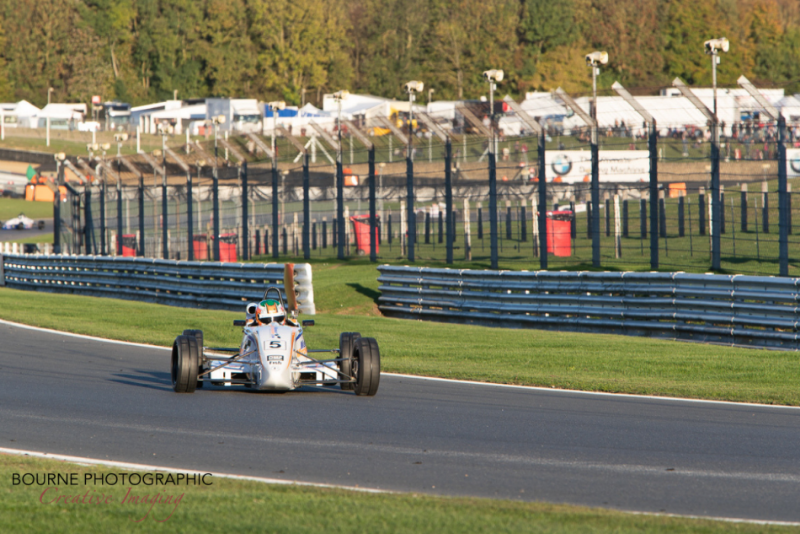
It’s a sad parallel with Dolan’s own career. This year’s National field was highly rated, but Dolan’s own title-winning time in FF1600 had an even higher quality opposition.
“When I first came here in ?88, my team-mate at the Mondiale works team was Jonathan McGall. He was very good, but I was getting better and better, and at the end of the year I was invited to test drive for all the works teams. All the teams asked me to drive, so I then had to pick.
“Those days don?t happen now, which is a shame. Because back then FFord was the stepping stone. Everybody came from around the world to learn their trade here. You could have a grid of 30 cars, and maybe only five English drivers.?FFord was [big] in the States, Australia, France, everywhere.
“In Britain you even had multiple championships, with senior and junior championships. [David] Coulthard was doing the junior while I was doing the senior, and then he joined senior at the end of the year.
“My biggest rival was [current McLaren sporting director] Gil de Ferran, my team-mate in ’89.?We got on very well together to be fair, and it was at Castle Combe where we fell out, because he broke team orders.”
In addition to multiple manufacturers and engine builders, FF1600 also had intricate team dynamics and rivalries that exceeded most national categories then and now.
“We were bang on the same wavelength in terms to how to get the best out of a car, so usually one of us would be on pole, and then the simple thing was we don?t race each other until the last couple of laps.
“At Combe, he made a mistake down at Quarry [a quick right-hander] on the opening lap. He ran a bit wide, so I pulled out to go past him, and back in those days we had no chicanes, it was just quick [all the way]. He moved on me, I wasn?t expecting it, and that put me on the grass. That was the first time we had a big fallout.
“He was going for the championship and I was leading it, and it was always going to be hard. Once we weren?t in the same team, we were fine. Not a bother. But it was that [as a rivalry].”
After the season ended, Dolan renewed his battles in the Festival, where he was the only driver to go unbeaten on the way to a dramatic final, where a poor start meant he lost.
“Dave Coyne was a works Swift driver, he was very good. The Duckmans driver at the time was Niko Palhares, you had [Jordi] Gene driving for Minister, [Adrian] Fernandez and [Michael] Vergers drove for Team JVA, and [there was] Coulthard too. You had a lot of [quality] drivers.
“Then I suppose Opel was probably where [drivers were going next]”.
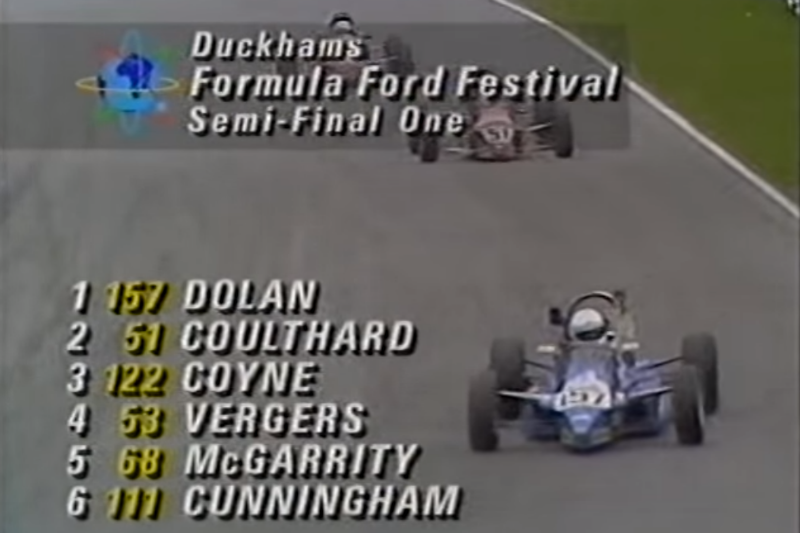
Formula Opel (or Vauxhall) was a winged category introduced in the late 1980s that heralded the era of single-spec formulae in the junior categories, a trend that causes Dolan to reflect on what FF1600 has to offer.
“If you look at any drivers that go on to make it to Formula 1 now through single-spec, they?re not good enough.
“They haven?t got the basic grounding, because the levels are too diversified. You need to have a clear division 1, 2 and 3. And you can?t go out of those division until [you?ve proven yourself]. Bit like back in my day, when it was FFord, probably Opel, which was very new then, but then it was F3.
“All those drivers who got to F1 back in those days, they invariably did two years in FFord, two years in F3, and probably two years in F3000. So when they left that, they made an impact in F1.”
The biggest fault in Dolan’s argument here is that although such a career path, in fields with a high concentration of talent, would arguably prepare drivers better, it goes against the trend that sponsors are unwilling to pay for multiple seasons in a championship in the majority of cases.
Diversification is a valid point, and team bosses in Europe have also expressed to Formula Scout that they believe the new regional F3 machinery is actually inferior as a learning tool compared to the ‘traditional’ Dallara F3 car, which was designed to compete against other constructors in the same races.
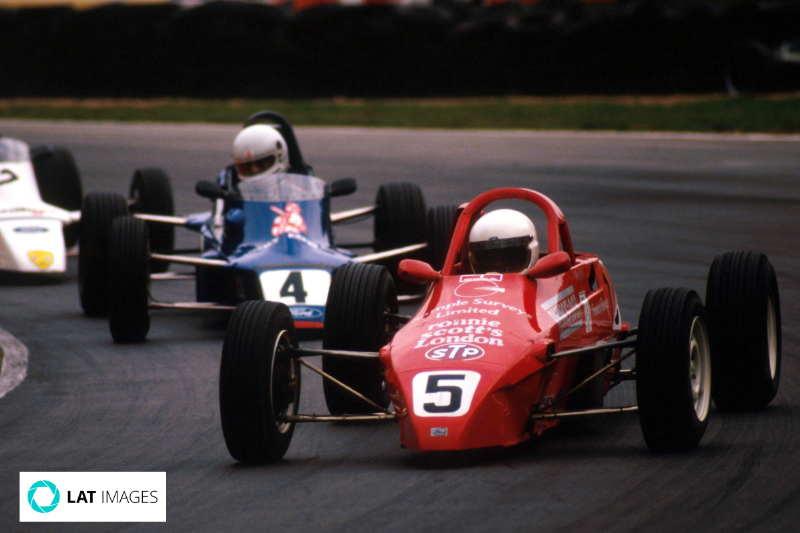
Johnny Herbert leading the 1985 Formula Ford Festival
“You look at [Jean] Alesi, [Eddie] Irvine, [Johnny] Herbert, they all made a massive impact. Because the class they were up against [in junior single-seaters] was so strong, to get to the next level you had to beat them. The bar was so high, like Niall is setting it now.
“When the bar is raised, the competition [has to improve], meaning FF1600 is getting tougher.
“You look at Joey Foster, who’s a very good driver, and you can see how tough it is. That?s very good for the young drivers coming in. Because there?s no point in ?ah yeah, I?ll go do F3′ if you can?t win at this. The lads coming from karting know if they can get to [Murray’s] level,?they?ll be in such a strong position for the next category they go on to.”
Despite FF1600’s lack of wings, and use of traditional H-pattern gearboxes, it’s undeniable that the sheer volume that can be learnt in the category exceeds that of its modern entry-level rivals.
“If you had that talent and ability within you, [being against the best] extracted that out of you. That?s why when they got to F1 they were already good. When you look at a lot of F1 drivers now, they get there and they?re not making the same impact, bar Max Verstappen.
“I wonder how much better a driver could he have arrived [to F1] as had he gone through the [junior single-seater] system the way it used to be.?But that?s just the way the world has gone, unfortunately.”
British drivers have the liberty of choosing F4 and FF1600 (or even F3) when entering single-seaters, but for Dolan there is only one option they should truly consider.
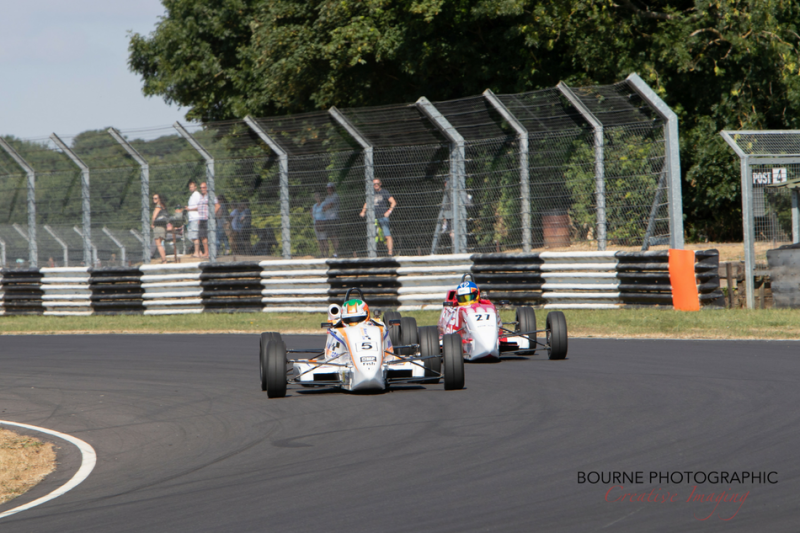
“For a young guy coming up from karting, I think the step to F4, and the costs associated with it, doesn’t add up. There’s nothing wrong with F4, but it doesn’t make sense for a youngster to go from karting to a really expensive class when they have so much to learn,?and they don?t even know if they?ve got what it takes to move on and up. So why not have a class like FF1600?”
It’s an open advert not only to the category, but to his own team, in which his ambitions lie further than FF1600.
“To me, this is only just the beginning. I want to bring it on to other levels, and I have to see where the other levels are. It?s all down to money though.?The results that Niall and Matt have got, hopefully that speaks for itself, and should help get other drivers in.”
Dolan’s already signed two-time Scottish FF1600 champion Ross Martin for the 2019 season, and looks set to be the team to beat again.
For more coverage of FF1600 in the UK and abroad, visit FF1600website.com.